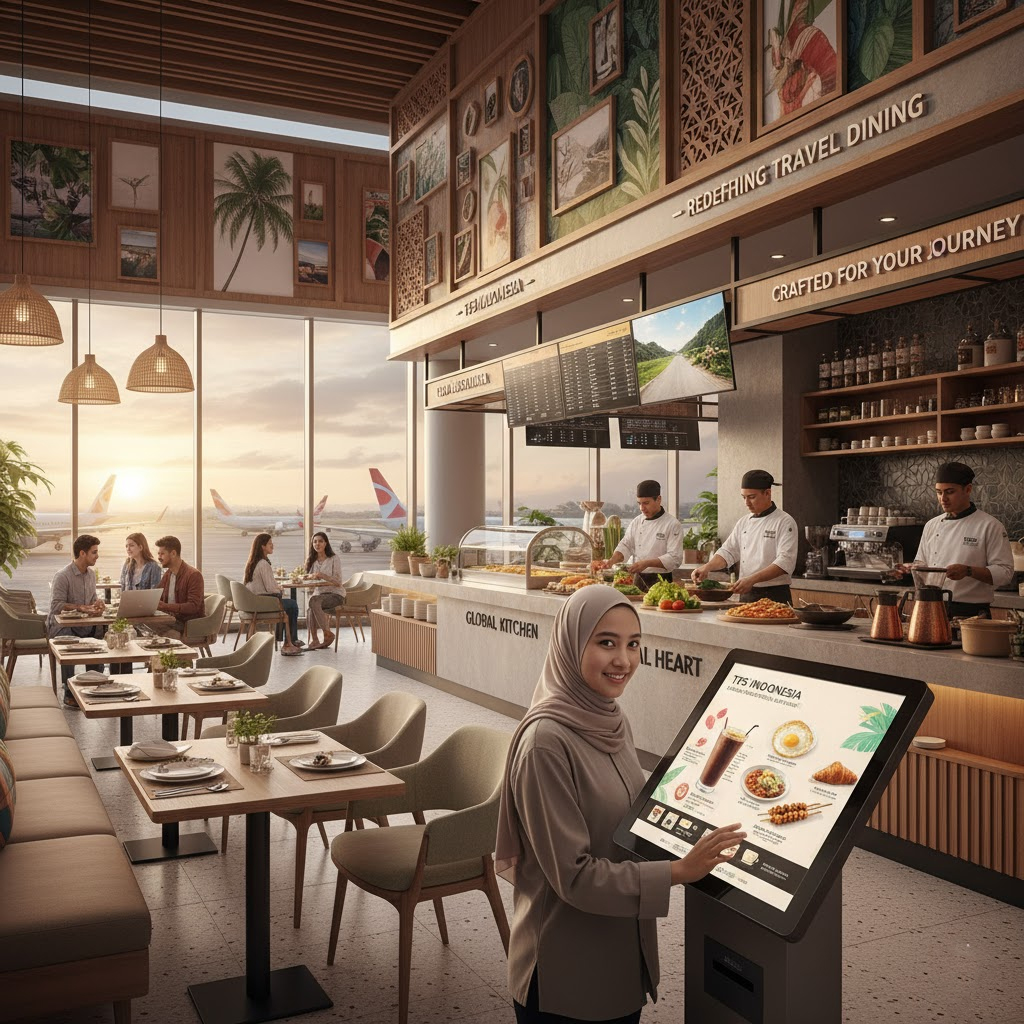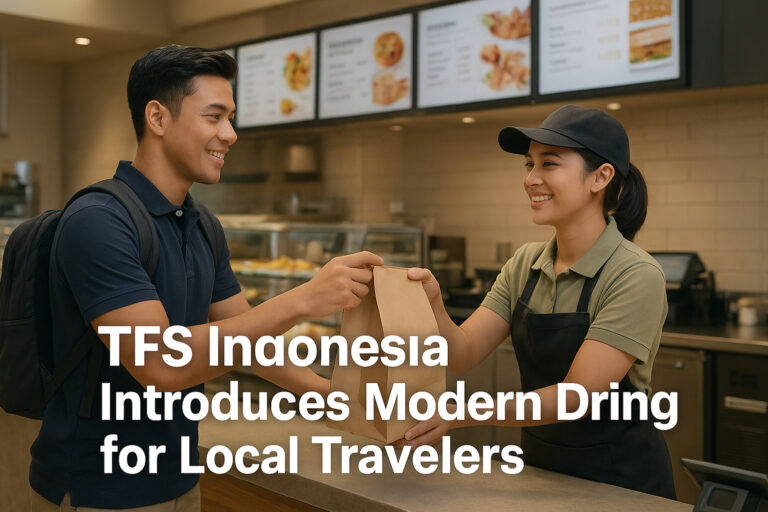Premium Biz Post – In an exciting move for the country’s growing travel and hospitality sector TFS Indonesia, redefining how people experience food on the go. As part of the global expansion strategy by Travel Food Services Limited (TFS), the company’s arrival in Indonesia marks a significant milestone in the evolution of travel-based culinary experiences, particularly at airports, train stations, and major transit hubs.

With Indonesia emerging as one of Asia’s fastest-growing tourism markets, the demand for quality dining options within travel infrastructure has never been higher. TFS, already known for its successful operations in India and the Middle East, seeks to bring a touch of global sophistication and local warmth to every traveler’s journey.
A New Era for Travel Dining in Indonesia
The modern traveler expects more than convenience; they seek quality, comfort, and authenticity—even during short transits. Recognizing this shift, TFS Indonesia plans to revolutionize the concept of eating while traveling. The company will introduce a diverse range of restaurants and cafés tailored to various traveler needs, from quick-service kiosks to upscale dining lounges.
Each outlet will be designed with sustainability, efficiency, and local culture in mind. Whether it’s a digital self-ordering system at an airport café or a curated menu highlighting Indonesian heritage dishes, TFS aims to blend technology with tradition seamlessly.
This approach reflects a broader transformation within the travel and food industries—one that prioritizes the traveler’s overall experience rather than treating food as an afterthought.
Global Expertise Meets Local Flavor
Travel Food Services Limited, headquartered in Mumbai, India, operates in over 40 locations across airports, railway stations, and highways. Known for its world-class service standards and innovative food concepts, TFS manages a portfolio of well-known brands and exclusive partnerships with international franchises.
In Indonesia, the newly formed PT Travel Food Services Indonesia will spearhead this initiative, focusing on delivering culinary excellence while promoting Indonesian flavors to the world. The company intends to collaborate with local chefs, ingredient suppliers, and hospitality professionals to ensure its offerings reflect both global quality and national identity.
“TFS has always believed in the power of local culture,” said a company spokesperson. “In Indonesia, we see immense potential not only to serve travelers but to celebrate the country’s culinary richness through every plate we present.”
From signature coffee blends inspired by Sumatra to modern interpretations of nasi goreng and satay, the menu lineup promises to combine comfort and adventure in every bite.
Strategic Expansion in High-Traffic Hubs
Indonesia’s major airports—Soekarno-Hatta (Jakarta), Ngurah Rai (Bali), and Juanda (Surabaya)—have seen record passenger traffic in 2025. These facilities are undergoing rapid modernization to accommodate growing domestic and international visitors. TFS Indonesia’s entry aligns perfectly with this momentum, as airport authorities seek partners who can enhance the traveler experience.
The company’s expansion strategy includes:
- Airport Dining: Launching quick-service restaurants and premium cafés in departure lounges and terminal concourses.
- Railway Stations: Introducing express food counters and grab-and-go concepts for commuters.
- Highway Stops: Developing family-friendly rest areas with curated menus for long-distance travelers.
- Partnerships with Local Brands: Collaborating with Indonesian F&B startups and established restaurant chains to localize menus.
The plan also involves leveraging digital technologies such as contactless payments, AI-based ordering systems, and real-time feedback apps to improve operational efficiency and customer satisfaction.
Read More : ”Beaded Accessories Small Touches of Art and Creativity”
Enhancing the Traveler Experience
Today’s travelers are increasingly health-conscious and environmentally aware. To address these trends, TFS Indonesia will prioritize sustainable sourcing, eco-friendly packaging, and waste reduction initiatives. The company aims to minimize its carbon footprint through efficient logistics and the use of renewable materials wherever possible.
Furthermore, each TFS outlet will feature a relaxing, aesthetic design—combining modern interiors with touches of Indonesian art and craftsmanship. The goal is to create spaces where travelers can unwind, recharge, and connect with the local culture, even in transit.
According to the Ministry of Tourism and Creative Economy, domestic travel in Indonesia grew by over 18% in 2025, supported by improvements in infrastructure and the rise of digital booking platforms. TFS’s arrival is expected to complement this growth by adding value to the country’s transport ecosystem.
Tapping into Indonesia’s Culinary Diversity
Indonesia’s food scene is a melting pot of flavors from more than 17,000 islands, offering an endless array of regional specialties. TFS Indonesia intends to showcase this diversity through its menus, rotating seasonal offerings that highlight specific provinces.
For example, travelers flying out of Bali might enjoy a Balinese-style grilled fish bowl, while those transiting through Yogyakarta could experience a modern twist on gudeg. The concept aims to make every stop a mini culinary journey, reflecting Indonesia’s identity as a nation rich in taste and tradition.
This local integration will also benefit small and medium enterprises (SMEs). TFS plans to collaborate with local food artisans, coffee roasters, and ingredient suppliers, helping them access larger markets through its network.
Technology-Driven Dining
As part of its innovation roadmap, TFS Indonesia is investing heavily in digitalization. Every outlet will feature mobile-friendly ordering, e-payment systems, and customer engagement platforms that reward loyalty.
Data analytics will play a key role in understanding traveler preferences, allowing TFS to tailor menus and promotions dynamically. For example, during peak travel seasons, the system can automatically adjust offerings based on passenger profiles or flight schedules.
This data-driven approach not only boosts efficiency but also ensures each traveler enjoys a personalized experience—something rarely found in traditional travel dining.
Workforce Development and Local Hiring
Beyond its culinary and technological ambitions, TFS Indonesia is also committed to building local capacity. The company will hire and train Indonesian professionals in hospitality management, culinary arts, and digital operations.
Through partnerships with local universities and vocational schools, TFS aims to offer hands-on internships and management trainee programs that help develop the next generation of hospitality leaders.
Such initiatives align with the Indonesian government’s broader goals of upskilling the workforce and promoting tourism-linked employment opportunities.
Challenges and Opportunities
While Indonesia offers immense opportunities, the market also presents challenges such as high logistics costs, complex licensing procedures, and fluctuating ingredient prices. However, TFS’s extensive experience in emerging markets gives it a strategic advantage.
By establishing centralized kitchens and adopting local supply chain networks, the company can maintain quality control while keeping prices competitive. Moreover, its global network allows for best-practice sharing and continuous innovation across regions.
Analysts believe this expansion could inspire other global F&B players to invest in Indonesia, creating healthy competition that benefits consumers and strengthens the country’s tourism ecosystem.
A Step Toward a Global Culinary Network
With the launch of PT Travel Food Services Indonesia, the company cements its presence in Southeast Asia and positions itself as a key player in the region’s travel dining sector. The move reflects a growing trend of globalization within the F&B industry—where food becomes a bridge connecting people, cultures, and destinations.
For Indonesian travelers, this means more than just access to better food; it signifies a redefined journey—one where every meal becomes a memorable part of the travel experience.
As the company continues to expand across airports and railway hubs, it envisions transforming Indonesia’s transit spaces into vibrant culinary destinations. In doing so, TFS Indonesia introduces while setting a new benchmark for hospitality excellence in the region.
The arrival of TFS Indonesia marks a transformative moment for the nation’s travel food landscape. By merging global expertise with Indonesia’s rich culinary traditions, the company aims to elevate the experience of every traveler—from morning commuters to international tourists.
In an age when travel is about more than just reaching a destination, TFS offers something deeper: a taste of Indonesia’s evolving identity, served fresh at every stop.



